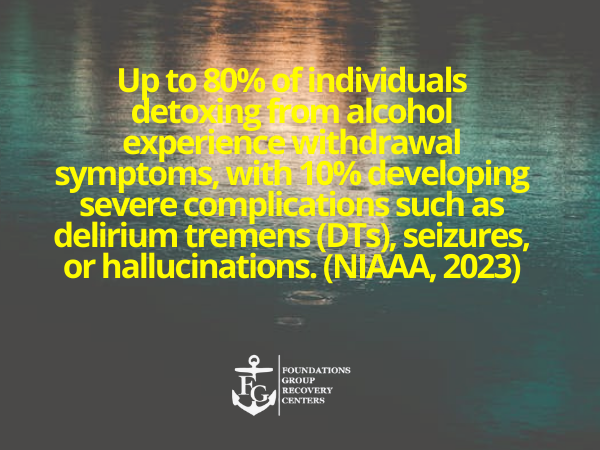Entering detox is a crucial first step in overcoming addiction, but making the right choice about where and how to detox can significantly impact your recovery. Detoxification is not just about removing substances from the body—it is also about ensuring safety, minimizing withdrawal discomfort, and preparing for long-term sobriety.
Choosing the right Addiction Treatment Center is essential, as different detox programs provide varying levels of care. At Foundations Group Recovery Centers, we offer Alcohol and Drug Detox along with comprehensive Addiction Treatment Programs, including Day Treatment, Half Day Treatment, and Outpatient Treatment Programs.
Before committing to a detox program, asking the right questions will help you determine the best path for your recovery. Here are five essential questions to ask before entering detox.
1. What Type of Detox Do I Need?
Not all detox programs are the same, and the type of detox you require depends on the substance used, the severity of your addiction, and your overall health. Understanding the different types of detox available can help you make an informed decision about your treatment.
Types of Detox Programs:
- Medical Detox – This is the most comprehensive form of detox, involving 24/7 medical supervision to manage withdrawal symptoms safely. Medication may be used to ease discomfort, prevent complications, and reduce cravings. Medical detox is necessary for individuals withdrawing from alcohol, opioids, or benzodiazepines, as these substances can cause severe or life-threatening withdrawal symptoms.
- Social Detox – Unlike medical detox, social detox does not involve the use of medications. Instead, it provides emotional and psychological support in a supervised setting. Social detox is better suited for individuals with mild to moderate addiction who do not require intensive medical intervention.
- Outpatient Detox – This option allows individuals to detox at home while attending regular medical check-ins at an Addiction Treatment Center. While outpatient detox can be convenient, it is not always recommended for individuals detoxing from alcohol, benzodiazepines, or opioids due to the risks associated with withdrawal.
Why This Matters:
Certain substances can cause severe withdrawal symptoms, including seizures, delirium tremens (DTs), and extreme psychological distress. Choosing the right type of detox ensures that you receive the appropriate level of medical care and support for a safe withdrawal process.
Key Question to Ask the Detox Center:
“What type of detox does your facility offer, and which option is best for my specific needs?”
2. What Withdrawal Symptoms Should I Expect?
Withdrawal symptoms vary depending on the substance, the length of time it was used, and an individual’s physical health. Some withdrawal symptoms are mild, while others can be life-threatening.
Common Withdrawal Symptoms by Substance:
- Alcohol – Symptoms range from mild anxiety and tremors to severe seizures, hallucinations, and delirium tremens (DTs), which can be fatal without medical intervention.
- Opioids (Heroin, Fentanyl, Prescription Painkillers) – Withdrawal symptoms include intense cravings, nausea, vomiting, muscle pain, diarrhea, and insomnia.
- Benzodiazepines (Xanax, Valium, Ativan, Klonopin) – Withdrawal can be extremely dangerous, with symptoms including severe anxiety, tremors, hallucinations, and seizures.
- Stimulants (Cocaine, Methamphetamine, Adderall, Ritalin) – Symptoms include depression, fatigue, paranoia, and body aches.
Why This Matters:
Being aware of potential withdrawal symptoms allows you to prepare mentally and physically for detox. The best Substance Use Treatment programs offer individualized withdrawal management to ensure comfort and safety throughout the process.
Key Question to Ask the Detox Center:
“What withdrawal symptoms should I expect based on my substance use history, and how will they be managed?”
3. What Happens After Detox?
Detox is only the beginning of recovery. While it removes substances from the body, it does not address the underlying causes of addiction, such as trauma, mental health issues, or behavioral patterns. Without transitioning into a structured treatment program, the risk of relapse remains high.
Post-Detox Treatment Options:
- Day Treatment Program – A structured, intensive treatment program that allows individuals to return home at night while receiving comprehensive therapy during the day.
- Half Day Treatment Program – A more flexible alternative that provides therapy and support while transitioning from a more intensive level of care.
- Outpatient Treatment Program – Designed for individuals who have completed detox and need continued therapy while maintaining work, school, or family responsibilities.
- Residential Inpatient Treatment – A full-time, immersive program providing 24/7 care in a structured environment for those who need higher levels of support.
Why This Matters:
Studies show that 90% of individuals who complete detox without further treatment relapse within the first year. A successful detox program should seamlessly transition clients into comprehensive addiction treatment to provide the best chance at lasting recovery.
Key Question to Ask the Detox Center:
“What treatment options are available after detox to help me maintain long-term sobriety?”
4. How Will My Detox Be Monitored?
Detoxing from drugs or alcohol can be physically and emotionally challenging, and medical supervision is essential to ensure safety and comfort.
Key Aspects of Detox Monitoring:
- 24/7 Medical Supervision – Ensures that withdrawal symptoms are managed effectively and that any medical complications are immediately addressed.
- Medication-Assisted Treatment (MAT) – Certain medications may be used to reduce cravings and withdrawal symptoms. For example, Suboxone or Methadone may be used for opioid detox, while Naltrexone may be used for alcohol detox.
- Mental Health Support – Many individuals experience anxiety, depression, or suicidal thoughts during detox. A detox program should provide access to counseling and mental health professionals.
Why This Matters:
Detox can be unpredictable, and without proper monitoring, severe withdrawal symptoms can become dangerous. A high-quality Addiction Treatment Center will provide around-the-clock medical supervision to ensure safety and comfort.
Key Question to Ask the Detox Center:
“Will I receive 24/7 medical monitoring, and do you offer medication-assisted detox if needed?”
5. Will My Insurance Cover Detox Treatment?
Cost is a major concern for many people seeking detox and addiction treatment. While many insurance providers cover Alcohol and Drug Detox, the level of coverage varies based on individual plans and providers.
Factors That Affect Insurance Coverage:
- Whether the detox facility is in-network or out-of-network
- The length of stay and whether medical detox is deemed necessary
- Coverage for additional Addiction Treatment Programs, such as Day Treatment, Half Day Treatment, or Outpatient Treatment
Why This Matters:
Financial concerns should not be a barrier to receiving life-saving treatment. A reputable Addiction Treatment Center will assist with insurance verification and financial planning to help make treatment accessible.
Key Question to Ask the Detox Center:
“Do you accept my insurance, and what out-of-pocket costs should I expect?”
Start Your Recovery Journey at Foundations Group Recovery Centers
Detox is the first step toward long-term sobriety, and choosing the right program is essential for a safe and comfortable experience. At Addiction Treatment Centers, we provide:
- Comprehensive Alcohol and Drug Detox
- Medical supervision and withdrawal management
- A seamless transition into Addiction Treatment Programs
- Flexible care options, including Day and Outpatient Treatment Programs
- Insurance verification and financial assistance options
Don’t wait to take the first step toward a healthier, addiction-free life. Contact Foundations Group Recovery Centers 844.763.4966 today to learn more about our detox programs and treatment options.
FAQ on Questions to Ask Before Entering Detox
Why is detox important before addiction treatment?
Detox is the first step in recovery, allowing the body to remove harmful substances while managing withdrawal symptoms safely. Without detox, it is difficult to fully engage in long-term addiction treatment.
How long does detox take?
The duration of detox depends on the substance used, duration of addiction, and individual health. On average:
- Alcohol detox: 5-7 days
- Opioid detox: 7-10 days
- Benzodiazepine detox: 2-4 weeks (gradual tapering)
Can I detox at home?
Attempting detox at home can be dangerous, especially for alcohol, opioids, and benzodiazepines. Medically supervised detox is recommended to manage withdrawal safely.
What happens after detox?
After detox, individuals transition into Addiction Treatment Programs such as Day Treatment, Half Day Treatment, or Outpatient Treatment Programs to address the underlying causes of addiction.
How do I start detox at Foundations Group Recovery Centers?
To begin detox, call 844.763.4966 to speak with our admissions team. We will assess your needs, verify insurance, and help you start your recovery journey.


